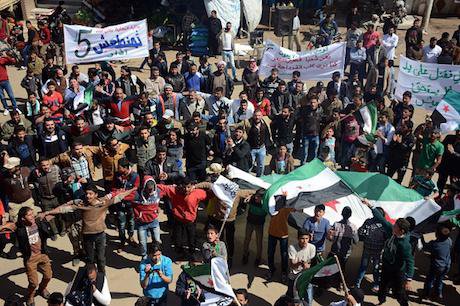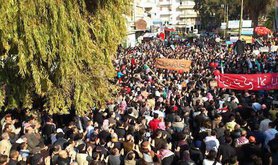
Muhammad al Yousef/Anadolu Agency/Getty Images. All rights reserved.Inequality is a top policy issue in the US presidential campaign. In fact, inequality impacts perceptions throughout the world, and the way we think about Syrian lives is no less prejudiced. We all know Syrians are victims of barrel bombs, torture, sieges, and mass displacement. But their suffering is seen through four distorted lenses. Why have Syrian lives mattered so little for five years?
A ‘religious’ war?
In his last State of the Union speech, president Obama said the region was “rooted in conflicts dating back millennia”. His stance echoes a longstanding tradition in western academia and policy: blame culture when policy fails. Is this deterministic line of argument really serving the president’s broader interests? The Middle East has experienced religious wars in the past. But shouldn’t all people have the opportunity to escape their history?
A popular misconception about the Syrian uprisings was that Sunnis were fighting Alawites to establish a Sunni fiefdom in Syria. But as was the case in post-2003 Iraq, sectarian strife in Syria was a result rather than a cause of war. In reality, Assad pitted Alawites against Sunnis to spread insecurity and ensure the regime’s survival. This political game was domestic and geopolitical. Iran was not merely interested in supporting its Shi’a brethren to support the Alawite regime, but also to preserve a political ally in its confrontation with the US and Israel.
President Putin benefited from the rise of the self-proclaimed Islamic State by receiving a blank check to intervene militarily alongside the Assad regime. Russia’s unexpected recent withdrawal of troops from Syria on the basis of nearly achieved objectives confirmed that opposition forces and not the Islamic State were primary targets. Through this Syrian quagmire, the Arab Gulf states found a golden opportunity to weaken Iran.
As for non-state winners in this conflict, their success was not immediate, but a calculated political opportunity. Even Hizbollah was not primarily motivated to support Assad because of religious affinity – there was no common religious behaviour between Hizbollah fighters and the Syrian regime and army – but because of pressure from Iranian sponsors. It was almost a year into the Syrian revolution in February 2012 that Ayman al-Zawahiri declared Syria to be a land of jihad (ash-sham ard jihad wa ribat) in a video recorded in Afghanistan. And al-Baghdadi proclaimed the Islamic State only later in June 2014.
Assad or Islamic State?
The simplistic choice between Assad and the Islamic State allowed the international community to ignore two important facts. First, Assad created the conditions that favoured the penetration of al-Qaeda and then the Islamic State into Syria from Iraq. Regime officials actively pursued and reached agreements with the Islamic State for the distribution of water and oil resources from the Tabqa dam regions under Islamic State control.
Second, this binary choice ignored viable long-term contenders for political power inside and outside Syria. Political representatives in the opposition have struggled for five years to claim their rightful place at the Geneva negotiations. But examples of successful resistance to both governmental forces and extremist groups include Syrian opposition like Raed Fares of the Union of Revolutionary Bureaus in the city of Kafranbel (Idlib province) and civilians in Maarat al-Nouman who demanded in protests the release of Free Syrian Army members arrested by the Islamist al-Nusra Front. Despite the relentless aerial bombardments last February by Russian and governmental forces in Aleppo, the local council has maintained its activities in neighbouring Azaz. Meetings with Syrian activists who provide food sovereignty in the areas besieged by government forces and who work toward common notions of citizenship in the Syrian League for Citizenship bear witness to the vibrancy of Syria’s civil society today.
Refugees as a security threat
Today’s global discourse has so internalised the different values attached to different lives that the Islamic State is seen mainly as a threat to Europeans and Americans, and refugees as a burden. In reality, the primary targets of the Islamic State are Syrians. And because people are still identified in relation to their group belonging and not for who they are, Syrians seeking refuge in Europe are collectively suspected of allegiance to the Islamic State. This prejudice cuts across class: it extends to affluent socioeconomic groups such as wealthy Syrian merchants and corporate investors who have contributed to the prosperity of the countries to which they transferred their monetary and human capital, but were never acknowledged to be one of the positive consequences of the crisis.
Partition as a solution for Syria
A further inequity lies in the way we imagine political solutions to conflicts. Most European governments feel threatened by political dissolution, but happily advocate it elsewhere. The partition of Bosnia achieved peace, but kept the country under international tutelage. And Iraq is still a failed state subject to corruption, authoritarian rule, and widespread insecurity. Who wants partition in Syria today? Not the majority of the population. The regime would be well served by a resource-rich Alawite enclave—and the Islamic State, as well as radical Islamist groups sponsored by foreign actors, would reap gains.
Lives do not matter equally within the US. Nor do they matter equally on the global stage. To find a sustainable political solution in Syria, we must move beyond clichés that confine Syrians to categories. Instead, we must recognise their plight and contribution, and strive for a settlement beyond the short-term gains dictated by dominant domestic and geopolitical interests.
Read more
Get our weekly email



Comments
We encourage anyone to comment, please consult the oD commenting guidelines if you have any questions.